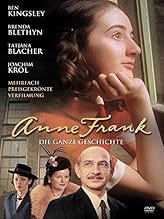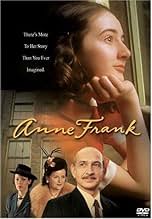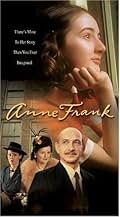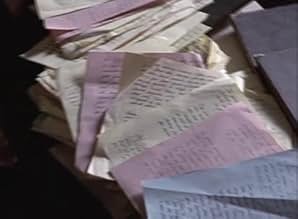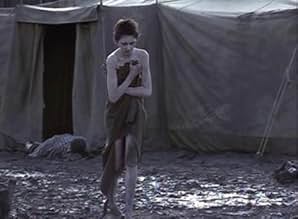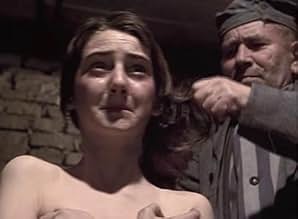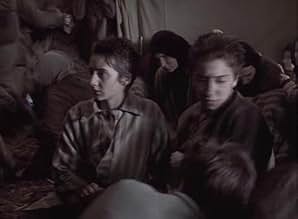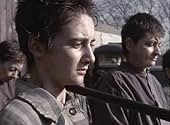La storia di Anna Frank
Aggiungi una trama nella tua linguaThe life of Anne Frank and her family from 1939 to 1945: pre-war fears, invasion of the Netherlands by German troops, hiding in Amsterdam, deportation to the camps, return of Anne's father.The life of Anne Frank and her family from 1939 to 1945: pre-war fears, invasion of the Netherlands by German troops, hiding in Amsterdam, deportation to the camps, return of Anne's father.The life of Anne Frank and her family from 1939 to 1945: pre-war fears, invasion of the Netherlands by German troops, hiding in Amsterdam, deportation to the camps, return of Anne's father.
- Vincitore di 2 Primetime Emmy
- 15 vittorie e 32 candidature totali
Recensioni in evidenza
For me, the virtual incarceration of her family in the factory was very sad and thought-provoking. Taken from their normal lives and stripped of all those things they held dear, Anne's family strives to remain positive of better times ahead. How would we fare if required to give up all that we possessed and go into hiding for fear of our lives? A totally depressing thought, and yet that is what happened to Anne and her family.
The later scenes, after the family was captured, humiliated, separated and sent to concentration camps, is simply tragic.
The fine performances of Hannah Taylor-Gordon in the title role and Ben Kingsley as her father, Otto Frank, deserve special mention, although the entire cast was believable. Hannah Taylor-Gordon's performance was a revelation - she conveyed a range of emotions that superbly captured Anne's spirit and also her human weaknesses.
The movie is not without its weaknesses. It is slow at times and could perhaps been improved by tighter editing, although this may have detracted from the accurate portrayal of the tediousness of living concealed behind closed doors for so long a period.
The concentration camp scenes are disturbing and Anne's gradual physical deterioration is depressing. It is not a movie to entertain but one to stir the emotions and the resolve to ensure that this sort of persecution and genocide is never again allowed to happen.
It is also a depressing reminder that it still is happening in various parts of the world.
My only criticism, there was one shot I felt was unnecessary even though it was arguably the best shot of the film. A starry night over the concentration camp. It looked beautiful, like a lovely dream, but I believe it was poorly placed. The whole film felt very real which is what makes it work so well, but this 1 shot felt like it was taking us out of reality and into dreamland. One lesson I have learnt from cinematography is that the most important thing to consider is not whether the shot looks good but whether it fits the scene. This shot may look lovely, but it does not fit the feeling of the scene for me.
Other than this, the film is astounding in every way, it is one of the greatest movies I have ever seen. We get a realistic view of the life that many people had to live during the war, the atrocities that took place and the very real reactions that they had to those afflictions. Many historians have said that this is the one Anne Frank film that gets everything right. Every aspect of it is accurate to what took place in the last few years of Anne Frank's life. Even to the point of being one of the only films that named the fellow hiders accurately as the Van Pels, which was their real name rather than the Van Daans that Anne's diary names them.
I have watched 1959's Anne Frank film adaptation, 2009's film adaptation, and 1995's documentary 'Anne Frank Remembered'. Yet, 'Anne Frank: The Whole Story' was the film that moved me most. Every moment feels significant. Furthermore, after watching 'Anne Frank Remembered' I have discovered that every moment is completely accurate, including the final third in the concentration camps, which would astound any viewer. How powerful those moments are and how perfectly constructed they are by the director Robert Dornhelm.
All of these Anne Frank adaptations, especially 'Anne Frank: The Whole Story' and 1959's 'The Diary of Anne Frank', have taught me a valuable lesson in life, of course, along with her diary too. Some of these quotes from Anne Frank may explain at least some of the power of her story. - "How wonderful it is that nobody need wait a single moment before starting to improve the world". "In spite of everything, I still believe that people are truly good at heart". "As long as this exists, this sunshine and this cloudless sky, and as long as I can enjoy it, how can I be sad?". "Those who have courage and faith shall never perish in misery".
This wasn't the best review, but I felt I needed to write it after watching this film. I could go on talking about it and the impact it has made on me and I'm sure there are aspects I have forgot to mention, however, it is best that you see it for yourself. There are of course some tough scenes to watch and I can only imagine how it must have been filming those moments, but I would advise anyone with an interest in history, war, and human life to watch this film.
Anne was magnificently played by Hannah Taylor Gordon. She is one of the best Annex that I have seen yet. She was perfect in her characterization and really made you love her. You looked at her on screen and you were caught in love with instantly, she was like magic on screen. She as well as Ben Kingsley and Brenda Blethyn both deserve Emmy nominations for their work.
Otto and Auguste van Pels were spot on. Ben playing Otto Frank not as a regal saintly savior of the Annex members (although in many respects he really was) but as a guiding light, the leader, and the most intelligent. Brenda Blethyn turns in another great performance as the spoiled and unadaptable Mrs. van Pels. Great in all her scenes you learn to give sympathy to this woman in a way you don't give anyone else, especially when you see her in the end.
The rest on the Annex members were also nice. Edith Frank was shown as she might really have been in real life. A woman going through a mid-life crises of sorts. Looking back and perhaps not being quite satisfied with her marriage and life. Peter van Pels was as I've never seen him before. The actor was excellent and gave life to Peter which is something I've always wanted to see from the Peter van Pels actors. Mr. van Pels and Mr. Pfeffer are wonderful too. And all of the Secret annex occupants really made a great relationship with the workers.
Lili Taylor pulled of a nice performance as Miep, very selfless and hard working. The rest were great too, including the warehouse worker. However, my main complaint was that Bep Voskuijl was shown to be an utter ditz. Maybe she was written this way because Miep said that that was the way she was, however, I did find it somewhat sad to see her portrayed that way.
The crew also pulled of excellent work. The costuming was nice. Barbara Lane was able to show with good quality how that Franks, van Pels, and Mr. Pfeffer were not poor. Never were they poor, they were very well off. I feel many costumers in the past have assumed that because they were all Jews being persecuted and in hiding that they were poor. Although the quality of clothing would have gone down with time (as shown) she still was able to put forth wonderful work. As did the art department going into nice detail to recreate the annex and the Frank house. Brilliantly filmed all around, power to the writer and producers for going outside the annex.
Lo sapevi?
- QuizSteven Spielberg was to be the executive producer, but declined after receiving a letter from Anne Frank's relatives asking him not be involved with the project because it was not based on the authorized account of Frank's life.
- BlooperIn the movie, the address given to the Germans of the hiding place over the telephone by the supposed informer is incorrect. The informer says the address is 263 Lindtstradt, but was actually 263 Prinsengracht. It still exists today as the Anne Frank House museum in Amsterdam. The real betrayer of the hiding place has never been revealed or proven beyond only circumstantial evidence. The informer depicted in the movie is based on the belief of Melissa Muller, who wrote the book (Anne Frank: A Biography) that the movie is largely based on. In her book "The Hidden Life of Otto Frank" by Carol Ann Lee, which was published in 2002 and revised in 2003, an entirely different theory as to the identity of the informer is presented. Officially, the identity of the actual informer that betrayed those in the hiding place has never been conclusively determined and most likely never will be, as most of those that would be able to shed more light on the subject have since died.
- Citazioni
Margot Frank: Do you remember how - how I was always taking care of you when you were little?
Anne Frank: Well, it's my turn to take care of you now.
Margot Frank: It doesn't matter anymore.
Anne Frank: No! You can't leave me here.
Margot Frank: Tell me a story, Anne. I used to love your stories.
Anne Frank: Pim's stories were always much better than mine. Poor Pim.
Margot Frank: But you're still going to be a writer though, aren't you? And he'd like that. Do you remember how we talked about it? About - about what we were going to do, after the war?
Anne Frank: And what were you going to be?
Margot Frank: I can't - I can't remember.
Anne Frank: Yes, you can. You have to! You wanted to be a nurse. That's what you told me.
Margot Frank: That's right. A nurse. A nurse in - in Palestine.
Anne Frank: Paris or London, that's where I'm going. To see the world.
Margot Frank: To see the world...
- ConnessioniFeatured in The 53rd Annual Primetime Emmy Awards (2001)
I più visti
- How many seasons does Anne Frank: The Whole Story have?Powered by Alexa
Dettagli
- Data di uscita
- Paesi di origine
- Lingue
- Celebre anche come
- Anne Frank: The Whole Story
- Luoghi delle riprese
- Aziende produttrici
- Vedi altri crediti dell’azienda su IMDbPro
- Tempo di esecuzione
- 1h 35min(95 min)
- Colore
- Mix di suoni
- Proporzioni
- 1.33 : 1


